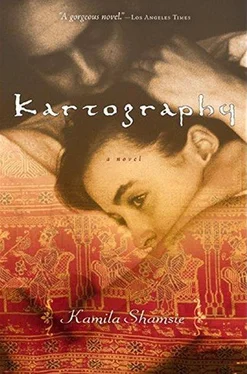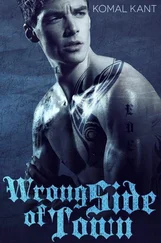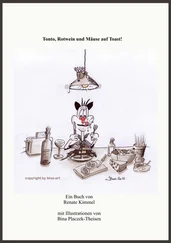‘So it’s not so special, is that what you’re saying? What I feel for Karim.’
‘Oh, darling. The thought of the two of you together brings such tears of joy to my eyes.’ She kissed the side of my head and handed me the entire plate of pakoras.
‘I’m really very confused,’ I said. ‘OK, one question: how do you forgive what he said?’
She stood up and started walking around the flat, hugging her paisley shawl close in the air-conditioned air. ‘I thought I was showing courage by staying in Karachi during all that madness, and I’m still not sure I wasn’t. But, you see, I was a Bengali. I was born that way. So though people turned away from me at parties, and conversations stopped when I entered the room, and all sorts of things went on that no one should have to live through, there was a certain…resignation, almost, in people’s attitudes towards me. I was just a Bingo, nothing to be done about it. But your father…your father was something much worse. He was a turncoat, a traitor. A Bingo-lover.’ She said the words slowly, as if examining them, trying to unravel their mystery. ‘That evening — when Shafiq got the telegram about his brother — Zafar had just come back from hospital. Broken rib, fractured thumb, bruises everywhere. He claimed he’d been mugged and beaten, but no one was fooled. There was violence in the air those days, and why should your father have been expected not to get terrified of it? Whatever he said to Shafiq, awful as it was, I don’t believe he meant it.’
‘If you didn’t believe it, you would have married him.’
Aunty Maheen walked over to the window and looked down at a bridge being raised so a boat could pass through. ‘You weren’t alive in those days. You don’t know what you’re talking about.’
She had never spoken to me in that tone before.
I walked over to the window. It was certainly pretty, the view of the river and the tall buildings, but I wondered what Aunty Maheen saw when she looked out. Did she see home?
As if she had read my mind she said, ‘I don’t think I could ever bear to go back to Karachi. First it was because I knew the kind of whispers that would go around about me. I think I was afraid almost — of being shunned, of having backs turn on me a second time round. And now…’ She ran her fingers over a book on the console table that had pictures of some of Karachi’s landmarks on the cover. ‘Now, it’s changed so much it might break my heart to see it. To be reminded that, after all, after everything, I’ve ended up a foreigner in that city.’
I put my arm around her, and thought of all my friends who weren’t planning to return to Karachi after university. Zia was still trying to convince me that I, too, should stay in America. He had even called up one of his father’s contacts who worked in a travel agency in New York and got him to agree to hire me. He meant well, so I didn’t tell him it was the kind of thing his father would have done. Besides, I hadn’t decided to turn down the job yet. What kind of home would home be without my friends in it?
‘I need to find a way to forgive my father. I think you’re the only person who can help me do that.’
‘No. I’m not. He is.’ Aunty Maheen lifted the Karachi book and shook it. A thin blue piece of paper with writing on either side fell out from between the pages. ‘This may help; it may not.’ Aunty Maheen handed me the blue paper. ‘As soon as you called I knew it was finally time to give it to you. I’ve had it a long, long time. Your father wrote it to me. I’m going down to the store to get something for dinner. You’re staying the night, of course.’
She left me alone, and I picked up the paper, and started to read.
Dear Maheen,
Already I’m thinking ahead to how I’ll end this letter, and in case you haven’t yet scanned ahead to find the answer to that question, let me tell you it will be with the phrase: my love always, Zafar.
I will show this letter to Yasmin when it is finished. She will approve the ending.
I’m more glad than I can say that the two of you are reconciled now that Raheen and Karim are born. I have seen you look at your son and then at Ali, and even I’m not vain enough to believe you are thinking of me for even a moment. But I know the first thought you have — will have, have already had, are having even now — of me in conjunction with your child will he: thank God. Because if we had been married your Karim would not have been born, nor would my Raheen — and how can we love the notion of some hypothetical children that might have been more than we love these tiny-fisted creatures who yesterday seemed entirely unaware of each other for fifty-nine minutes of the hour they were together, yet turned to each other in that sixtieth minute, and Raheen — with eyes shut — reached out and put a hand on Karim’s cheek, and Karim kept looking at her without blinking.
I picture them already as firm friends. And then I picture them growing up, and, Maheen, what will I say to my daughter when she is old enough to understand the truth and all its implications?
Nothing can excuse or erase what I said. So why am I writing this letter? To tell you that if you want me to stay always silent about how things ended between us, I will. But your heart has always been far greater than mine, so let me first — please, Maheen, don’t stop reading. I should tear this up, it makes little sense, but if I wait to write again until I can craft every sentence, I may never write.
What I was saying was — oh, I don’t even know. But I know this — it is less than two years since Bangladesh was born, and already we in Pakistan have become so efficient at never speaking about it. That scares me more than anything else. When we do refer to ‘yi, it’s as personalised stories about sitting on the roof, sipping whisky and watching the dogfights in the sky, or about waiting for a dawn that never came because the oil refineries were bombed and a thick cloud of smoke shut out the sun. We tell these stories and contain the horrors of war into four-line anecdotes that we tell over tea and biscuits.
I don’t claim to be better than any of the people who do this — it’s simply that my war story is you, Maheen, and you will not be contained within four lines; instead, you bring up all the memories the rest of us try to forget.
What happens when you work so hard to forget a horror that you also forget that you have forgotten it? It doesn’t disappear — the canker turns inwards and mutates into something else. In this city that we both love and claim — even though our families’ histories lie elsewhere — what will the canker become? This is turning into a diatribe, I know, but I must say it because all the silence around me is so terrifying. Yes, I am terrified, Maheen — because this country has seen what it is capable of, but it hasn’t yet paused to take account.
We should not have kept our name.
Pakistan died in 1971. Pakistan was a country with two wings — I have never before thought of the war in terms of that image: a wing tearing away from the body it once helped keep aloft — it was a country with a majority Bengali population and all its attendant richness of culture, history, language, topography, climate, clothing…everything. How can Pakistan still be when all of that, everything that East Pakistan added to the country, is gone? Pakistan was a nation with an image of itself as a place that was created because that creation was the only way its leaders saw possible to safeguard the rights of a minority power within India. How can Pakistan still be when we have so abused that image — first by ensuring the Bengalis were minimised and marginalised both politically and economically, and then by reacting to their demands for greater rights and representation with acts of savagery? How can Pakistan still be when the whole is gone and we are left with a part? (When we are willing to treat a part as the whole don’t we fall victim to circumscribed seeing, a thing we can ill afford?) We should have recognised that the Pakistan of dreams died and was buried in the battle fields of ’71. Or…
Читать дальше












